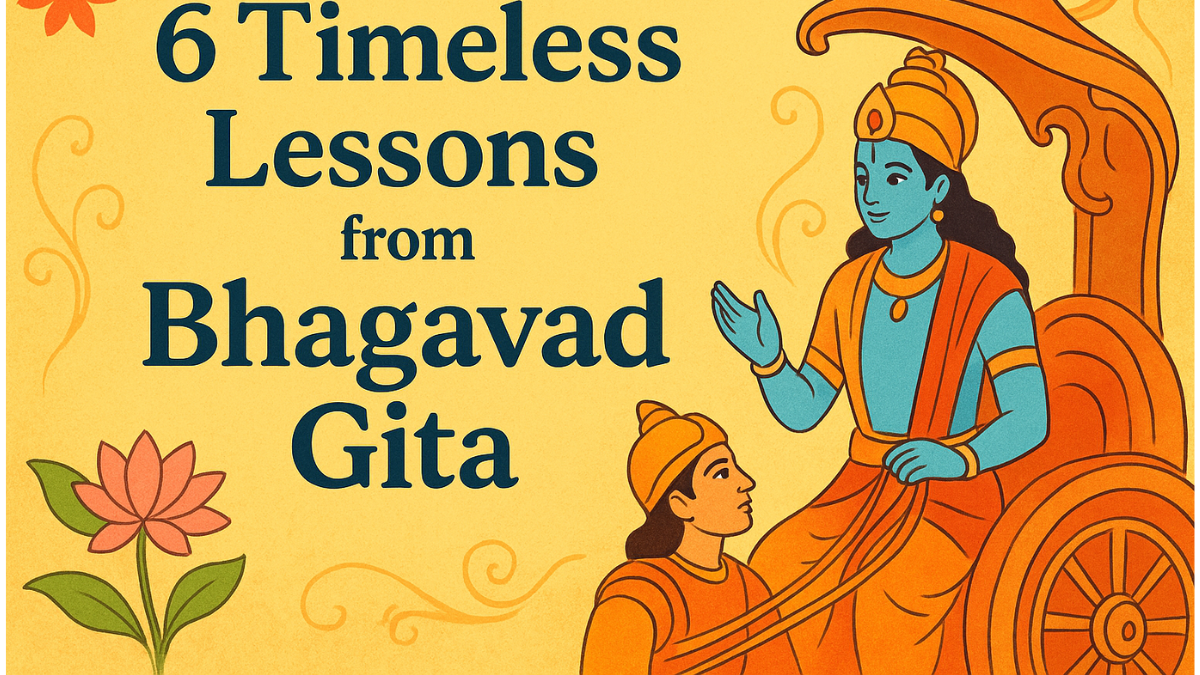Preparing for any major entrance test feels like a lone trip up a hazardous mountain. You’re surrounded by towering textbooks, challenged by sleepless nights, and burdened by heavy pressure to succeed. In this condition of high-stakes anxiety, it is usual to be constantly battling self-doubt and distraction.
What if the key to winning today’s mental marathon was found in a 5,000-year-old philosophical treatise, rather than a new time-management app?
The Bhagavad Gita, an ancient Indian scripture, provides a remarkably useful mind-toolkit. It contains profound, timeless truths that can help you navigate the storm of exam preparation and emerge with not only a good score but also a deeper sense of self.
Six Timeless Lessons to Help You Pass Your Exams
Whether preparing for examinations or facing life’s difficulties, the Bhagavad Gita instills clarity, purpose, and tenacity. Discover how the Bhagavad Gita’s life-changing lessons can help you achieve success with calm, determination, and a good attitude.
For When You’re Scared of the Outcome
You’ve spent the hours, read your notes until they’re dog-eared, and worked through a mountain of practice questions. But a constant dread of what might happen looms over you with every thought. This preoccupation with “what if I fail?” can freeze you solid, unable to enjoy the work you’ve already put in.
The Bhagavad Gita provides a strong antidote to this fear. It instructs us to center our attention squarely on the quality of our effort and let go of our attachment to the outcomes, which are ultimately out of our immediate control.
कर्मण्येवाधिकारस्ते मा फलेषु कदाचन।
मा कर्मफलहेतुर्भूर्मा ते संगोऽस्त्वकर्मणि।।
“You are entitled to do your duty, but not to the consequences of your action. Never think you are responsible for the outcome, and never identify yourself with inaction.” (Chapter 2, Verse 47)
Consider how liberating that is. This approach does not imply that your labour is worthless; rather, it implies that your labour is all that matters. The final score is a snapshot in time, but the work ethic you established, the skills you learnt, and the toughness you grew up with are long-term advantages that you will carry with you for the rest of your life.
For when you can’t seem to focus
You clear your desk, open your book, and resolve to have a productive study session. Minutes later, your thoughts have shifted to a dozen other issues, or you become lost in the endless scroll of a social media feed. In today’s world of constant digital distraction, the ability to focus deeply is equivalent to a superpower.
Lord Krishna redefines “yoga” not as a set of bodily positions, but as a state of complete mental acuity and optimal performance in whatever you do.
योगः कर्मसु कौशलम्।
“Yoga is excellence in action.” (Chapter 2, Verse 50)
This is an invitation to become masterful at being fully present. We’re told to multitask but it’s a lie when it comes to deep learning. Each time you context-switch, you incur a cognitive cost that depletes your mental resources. True greatness comes from directing your total awareness to a single thing at a time. This single-minded attention is where actual progress occurs. But how do you keep concentrating when the stakes are high?
For When Mock Tests Feel Like an Emotional Rollercoaster
The outcome of a practice test can put your mood in a tailspin or propel you to the heights. A good score makes you feel like Superman; a bad one causes someone to break out in a cold sweat of panic and despair. Bouncing on this emotional rollercoaster is draining and allows for a steady, consistent study approach to be all but impossible.
The Gita encourages the development of a state of equanimity—approaching the highs and lows with the same smooth, steady mind. It’s about perceiving each result as a tidbit of information, not an ultimate judgment on your value.
सुखदुःखे समे कृत्वा लाभालाभौ जयाजयौ।
ततो युद्धाय युज्यस्व नैवं पापमवाप्स्यसि।।
“Treat happiness and distress, gain and loss, victory and defeat as the same. Then, engage in your duty. By doing so, you will not incur sin.” (Chapter 2, Verse 38)
When you take this attitude, a practice test becomes less of a day of judgment and more of a diagnostic instrument. Both failure and success are then neutral data points that inform your next move. They reveal to you where you’re good and where you can get better, without determining who you are.
For When You Feel Isolated and Alone
The atmosphere that accompanies competitive exams can be profoundly isolating. You’re surrounded by fellow travelers, but it’s possible to feel completely alone, trapped in a loop of comparing your journey to other peoples’ and perpetuating a cycle of self-doubt.
Here, Krishna gives a stern reminder: your greatest enemy, and your most powerful friend, is the mind you carry within. You have the inner power to be your own source of strength.
उद्धरेदात्मनात्मानं नात्मानमवसादयेत्।
आत्मैव ह्यात्मनो बन्धुरात्मैव रिपुरात्मनः।।
“One has to raise himself by one’s own mind and not lower oneself. The mind is the friend of the conditioned soul, and it is also the enemy.” (Chapter 6, Verse 5)
This is an invitation to be your own champion. Rather than letting that inner critic be in charge, take a conscious decision to be your own coach. Recognize your small wins. Give yourself a pep talk when you’re down. Keep in mind that your path, with its own set of challenges and victories, is yours and yours alone.
For When You Ask, “What’s the Point of All This?”
Drowning in a sea of formulas, historical dates, and complex theories, you can hit a wall. The motivation that started, you end up burning out, and the looming question becomes, “Why am I putting myself through this?” The stress obscures any sense of purpose.
The wisdom of the Gita breaks through this cloud by instructing us on the importance of doing our work with complete dedication, regardless of any external reward. The goal is found not in the future reward, but in the immediate action.
तस्मादसक्तः सततं कार्यं कर्म समाचर।
असक्तो ह्याचरन्कर्म परमाप्नोति पुरुषः।।
“Therefore, not attached to the fruits, one must act out of duty, because by doing work without attachment, one reaches the Supreme.” (Chapter 3, Verse 19)
Shift your mindset. You’re not merely attempting to pass an exam. With each chapter you study and each problem you solve, you are building discipline, developing resilience, and honing your concentration. You are actively growing into a more competent you.
For When You’re Simply Tired of Studying
Let’s be honest: the sheer volume of material required for a major exam can turn the joy of learning into a monotonous grind. What once sparked curiosity can begin to feel like an obligation, leaving you feeling drained and uninspired.
To combat this weariness, the Gita provides a deep change in outlook, reminding us that knowledge is not a drag but a cleansing and strengthening energy.
न हि ज्ञानेन सदृशं पवित्रमिह विद्यते।
“In this world, there is nothing as pure as knowledge.” (Chapter 4, Verse 38)
This isn’t a poetic declaration; it’s an operating reminder. Each new idea you understand broadens your world. Each talent you acquire makes your mind stronger. View this time not as a punishment to be suffered, but as an uncommon luxury to give yourself fully over to the process of learning.
Conclusion
The eternal wisdom of the Bhagavad Gita provides a powerful approach to shift your focus away from the crushing weight of the outcome and onto the valuable process of your own development. Accepting these ideas allows you to transform a period of intense strain into one of self-awareness, perseverance, and deep concentration. You’re not studying for a single exam; you’re studying for life.

 What Is a CUET PG Good Score?
What Is a CUET PG Good Score?
 Best MA Economics Colleges in India 2026...
Best MA Economics Colleges in India 2026...
 Best Class 12 Chemistry Important MCQs f...
Best Class 12 Chemistry Important MCQs f...



